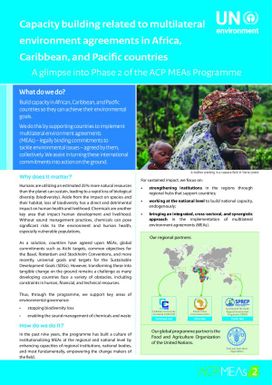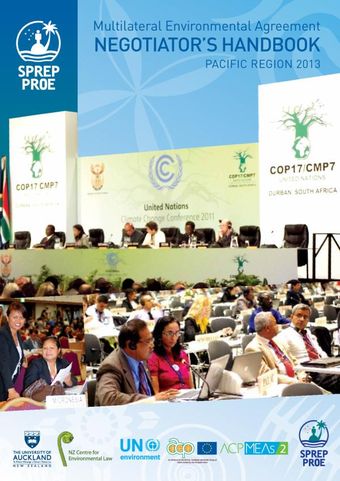Capacity-building related to multilateral environmental agreements (MEAs) in African, Caribbean and Pacific countries - A glimpse into Phase 2 of the ACP MEAs Programme
- Description:
- Many developing countries are unable to fulfil their obligations as signatories of multilateral environmental agreements (MEAs) as they tackle increasingly complex scientific and technical issues. Inadequate human, financial, and technical capacity are some of the constraints that severely impact their ability to implement MEAs. In order to address this pressing issue, the United Nations Environment Programme (UN Environment) and the Food and Agriculture Organization of the United Nations (FAO) have joined forces with the European Commission (EC) and the ACP Secretariat (African, Caribbean, Pacific Group of States Secretariat) and regional organizations, namely, the Secretariat of the Pacific Regional Environment Programme (SPREP), the Caribbean Community Secretariat (CARICOM) and the African Union Commission (AUC) to enhance the capacity of African, Caribbean and Pacific (ACP) countries to improve the implementation of specific MEAs.
- Display date:
- 2017
- Collections:
- Secretariat of the Pacific Regional Environment Programme (SPREP)
- Publisher:
- United Nations Environment Programme (UNEP)
- Content partner:
- Secretariat of the Pacific Regional Environment Programme (SPREP)
- Availability:
- Not specified
-
Copyright status: All rights reservedFind out more about what you are able to do with this itemThis item is all rights reserved, with means you'll have to get permission from Secretariat of the Pacific Regional Environment Programme (SPREP) before using it. For more information, please see our use and reuse page.What can I do with this item?Non-infringing useNZ copyright law does not prevent every use of a copyright work, and this item may be hosted by an international institute or organisation. You should consider what you can and cannot do with a copyright work.No sharingYou may not copy and/or share this item with others without further permission. This includes posting it on your blog, using it in a presentation, or any other public use.No modifyingYou are not allowed to adapt or remix this item into any other works.No commercial useYou may not use this item commercially.
Related items
Welcome and warm Pasifik greetings
The information on this site has been gathered from our content partners.
The names, terms, and labels that we present on the site may contain images or voices of deceased persons and may also reflect the bias, norms, and perspective of the period of time in which they were created. We accept that these may not be appropriate today.
If you have any concerns or questions about an item, please contact us.

